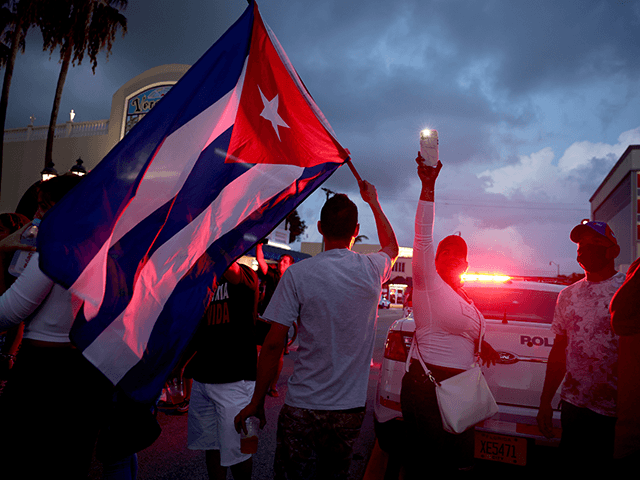Christians in Cuba are facing extreme repression and even more severe human rights violations than usual this year as the regime condemns those accused of marching in the July 11 protests to outrageous prison sentences and Christians become an increasingly visible part of the anti-communist movement.
Cuba experienced some of the largest protests in its history this summer. An estimated 187,000 people in almost every municipality on the island marched peacefully on that day demanding an end to the communist regime. Massive protests again rocked Cuba on November 15, this time led in many cities by priests and nuns, who have increasingly taken on a leadership role in the anti-communist movement.
Christmas was once the biggest holiday in Cuba and remains the largest holy celebration in the Cuban exile community. In Cuba, however, the officially atheist Communist Party has endeavored for decades to eradicate Christianity outside of radical leftist “Liberation Theology” and allowed the Vatican to operate in the country only as a subordinate to regime. Christians outside of the Catholic Church, or Catholics who pointed out that the faith was at odds with the violence and repression of the region, have for decades faced beatings, torture, firing squads, and prolonged imprisonment.
“¡Viva Cristo rey!” (“Long live Christ the king!”) became common final words at Cuba’s firing squad walls in the 1960s as the Castro regime eliminated Christians.
Prominent members of the global anti-Castro movement fear that the number of Christians behind bars or otherwise persecuted in the country this Christmas may be far larger than in previous years due to the shock that the July 11 protests caused within the highest levels of power in the regime. The overtly Christian nature of the November 15 protests – leading to house arrests and orchestrated mob harassment of priests and nuns – has also exacerbated concerns of state security engaging in anti-Christian attacks.
“The communist regime in Cuba has always designated Christmas as a symbol of Christian resistance,” Orlando Gutiérrez-Boronat, the co-founder and spokesman for the Cuban Democratic Directorate (Directorio), told Breitbart News on Wednesday. “It has sought to stamp out the beautiful and unique way in which the Cuban people celebrate this beautiful tradition.”
Gutiérrez-Boronat predicted that repression this Christmas could increase compared to past years due to heightened anti-communist activity, particularly among the clergy.
In a column published Monday, Cuban journalist Alejandro Rojas branded December “the cruelest month” for Cubans due both to government repression and the traditional communist economic incompetence that makes any celebration impossible.
“Generally, December tends to be one of the loveliest months in the Hispanic world, due to the celebration of Christmas Eve, Christmas, and the arrival of the New Year,” Rojas wrote. “The bosses of the Cuban dictatorship, however, have returned for their ideological privileges with the punishment of a Communist Party plenary session.”
Cubans face “indoctrination” and the typical “absurd social parameters” of the Revolution this month, not the joyous Christian celebrations of the past, Rojas lamented.
The U.S.-based Radio Martí reported on Thursday that the Castro regime appears to have accelerated the criminal case against a pastor, Lorenzo Rosales, who participated in the July 11 protests. Prosecutors this week, in a hearing bizarrely timed for Tuesday night, asked the court for ten years in prison for Rosales on charges of “disrespect,” a crime in Cuba, and “instigating delinquency.” Rosales merely peacefully assembled with other protesters in Palma Soriano, like tens of thousands did on that day.
Wife Maridilegnis Carballo told Radio Martí that state agents openly gave false testimonies at the hearing to justify demanding a decade-long prison sentence.
“It was the testimonies of the witnesses from the prosecution – who were, in their majority, all the cops – who said they were afraid, that they felt terror because people had sticks, rocks, bottles,” Carballo told the outlet. “None of that was true.”
The independent Cuban outlet Cubanet revealed on Wednesday the details of a mass trial of 15 dissidents allegedly taking place in mid-December. The protesters were arrested during the July protests, meaning they were imprisoned without a trial for half the year. Despite being arrested in different places and situations, the 15 defendants faced the same charges: initially, “disrespect” and public disorder, but later the more serious charge of “sedition,” which is an elevated “national security” crime. The group was found collectively guilty and sentences ranged from 12 to 30 years in prison.
The mass trials began in July. The human rights group Cuban Prisoners Defenders revealed that month that sources on the ground had evidence that courts were prosecuting as many as 30 people at a time – often minors and adults in the same room – and finding them all guilty to rapidly dump them in prisons and move on to process more. No concrete estimates of the number of people arrested on July 11 exist, but most human rights groups studying the aftermath of the protests believe that police detained thousands. Many of those released have complained that they were arrested for being near a protest, but not participating in them, and had no record of government opposition.
By November, Cuban Prisoners Defenders had documented a 400-percent increase in the number of known political prisoners in Cuba, warning that the estimate was likely significantly lower than the actual total of political prisoners, as many have simply gone missing.

COMMENTS
Please let us know if you're having issues with commenting.